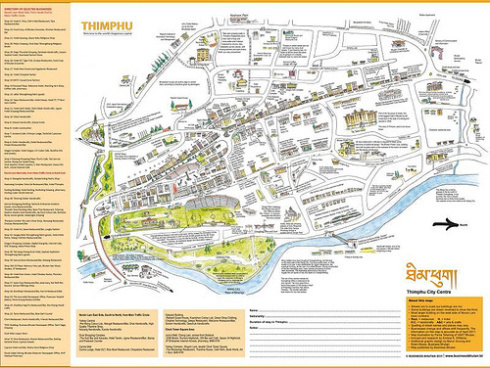Lisa Napoli's Blog, page 5
March 28, 2013
HIV on the rise among Buddhist monks in Bhutan
It’s sad to read the news that HIV and other STDs are on the rise among young monks in Bhutan.
But given that many of these monks haven’t chosen the religious path, but rather, have been sent down that road by parents or guardians, it’s not surprising.
Poor families often send a child to the monastery to relieve the burden on the household of raising another kid; orphaned kids are sent when there’s no one to take them in.
In this story from Religion News Service, stress and lack of recreational facilities are blamed, too.


March 22, 2013
False prophets and guru-free devotion
Can you be religious and not belong to an organized religion? Can you believe without claiming allegiance to a guru or spiritual leader?
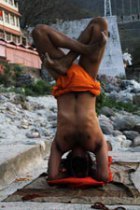 Vikram Gandhi’s film Kumare: The True Story of a False Prophet humorously (and scarily) puts a point on our fervent desire to find meaning and belonging and order in this chaotic universe—so dearly that we’ll suspend common sense.
Vikram Gandhi’s film Kumare: The True Story of a False Prophet humorously (and scarily) puts a point on our fervent desire to find meaning and belonging and order in this chaotic universe—so dearly that we’ll suspend common sense.
(Kind of the way people fall in love, ascribe perfection to a beloved, and imagine that he or she will “save” you. And then, get angry when time passes and, zowie, that object of your affection is a mere mortal.)
Filmmaker Gandhi takes on the persona of a made-up spiritual leader (see photoos) and amasses devotees, then wrestles with the consequences of having their spiritual lives in his hands.
 When Mark Kellner of the Washington Times wanted to write a column about my mid-life stirrings of religious belief, I was reluctant. (And while it’s a lovely write-up, I hate that the word enlightenment was used. More like, “stirred.”)
When Mark Kellner of the Washington Times wanted to write a column about my mid-life stirrings of religious belief, I was reluctant. (And while it’s a lovely write-up, I hate that the word enlightenment was used. More like, “stirred.”)
Just as yoga has become commoditized, trendy and a cliche, so, in a way, has Buddhism.
I don’t have a guru, or a spiritual advisor, and I don’t want one. I’m actually reluctant to classify myself, because my beliefs are bigger than a label.
And then there’s the whole intellectual anti-religious belief system, to which I subscribed for years.
It’s not religions that are scary, usually. It’s when they get into the hands of people who abuse the power of devotion.
By talking to Mark, I realized I am drawn to Buddhism because in its purest form, it doesn’t require belonging.
This is why I love studying and sitting with, and learning from. my friend the Buddhist monk, Rev. Kusala. He’d run screaming if anyone called him a guru or spiritual advisor. He just happens to be a man who dedicated his life to Buddhism and expresses it by living and working and serving the community.
Not by amassing followers who pay big bucks to sit on retreats with him, at his feet, soaking up his divine goodness, dearly hoping that by association, they’ll be good, too. Or by living in a cave.
I kind of found this kind of all-in devotion with the Kingdom of Bhutan, and, well, wrote a whole book about the subject. People (myself included) get so sucked in to the beauty and magic of the place that they don’t see that it’s just, well, a place. A special, magical, beautiful place, unlike any other in the world, that is as perfect and imperfect as any other. Just different.
There is no perfect place, just as there is no perfect person. And any one who professes to hold special mystical powers….is someone you should avoid (especially if there’s an implict or explicit request for money.)
That’s kind of the message of the film Kumare, and my book, Radio Shangri-La. Even though reaching that conclusion involves a different path.


March 21, 2013
“Just walk into that cloud:” Books and films about Bhutan
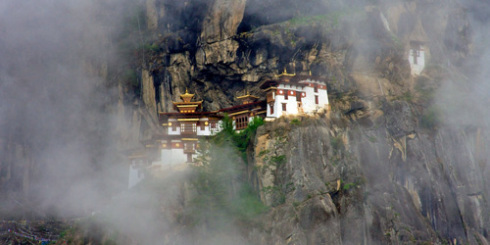 I’m not eager to advance the clock, but I do hope when I’m a very old woman, Radio Shangri-la will still pique the interest of people curious about the birth of the information age in Bhutan.
I’m not eager to advance the clock, but I do hope when I’m a very old woman, Radio Shangri-la will still pique the interest of people curious about the birth of the information age in Bhutan.
Since we’ve got time for that: Here’s a new story on the website Popmatters that rounds up books and films about Bhutan–some of the usual suspects, and some that aren’t. I’m honored to be included.
And of course you can find more in the bibliography of Radio Shangri-La, which I’ve got posted online. Lots of self-published tomes on the “land of happiness” have appeared since my book came out two years ago. A couple other books by established publishers, too. Before recently, there wasn’t a huge body of work about the Kingdom–and much of it was very, very old.


March 20, 2013
Happy International Day of Happiness day. It’s not as frivolous as it sounds
 The UN has declared today the first “International Day of Happiness.” It’s not about skipping merrily around or buying that Porsche you thought might make your life complete.
The UN has declared today the first “International Day of Happiness.” It’s not about skipping merrily around or buying that Porsche you thought might make your life complete.
It’s about a focus on well-being, and all that entails: community, health, access to clean water and good food. A reminder that reckless pursuit of wealth isn’t good for the planet.
Just like every day should be women’s day, or mother’s day, in the sense that we shouldn’t need a special day to honor women or moms, every day should be a day where we are aware of the impact of our actions on each other and the planet, and the power of how we spend our time and money.
Of course, it’s not. But having a big publicity stunt can’t hurt to plant the notion of these ideals–that you can be a conscious consumer, a better member of your community, that unsustainable growth is short-sighted, that there are other ways to live than in a purely cash-grab culture–in the public consciousness.
All of this stems, of course, from Bhutan and Gross National Happiness. Last year at the UN there was a big confab lead by Bhutan about these notions. While Bhutan isn’t perfect, hardly perfect, it is a world leader in rallying governments and the people who lead them to discuss GNH over pure unbridled GDP.


March 16, 2013
A story of authentic giving
And giving, of course, is an enormous component of happiness.
This beautiful story about a man (a busy judge!) who has been training homeless people to run in the LA Marathon is an example of true community service–not someone who is doing it because they “should” or “have to” or because they get some sort of tax credit.


March 14, 2013
Google and the car wash invade Shangri-La
First, the news earlier this week that Bhutan has got its first automated LA-style car wash. After all, there are close to 60-thousand vehicles in the country, so it only stands to reason their owners would want to keep them clean.
Now, word that Google’s cruising the streets to map the once-isolated country with its Street View technology. (Once complete, you’ll find them here.) This may sound like a big ho-hum, unless you consider that until not very long ago, there weren’t even street addresses in the capital city, much less widely-available maps. (Not to mention that visitors are still a relatively new phenomenon.)
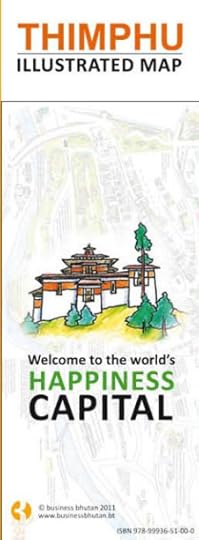 In fact, just a few years back, it was a big deal when Canadian cartographer Andrea Williams volunteered to make a map of the capital city, Thimphu. And just a few years before that, of course, it was a big deal that Bhutan got a radio station–which enabled the growing number of vehicles to have live, local accompaniment to their rides.
In fact, just a few years back, it was a big deal when Canadian cartographer Andrea Williams volunteered to make a map of the capital city, Thimphu. And just a few years before that, of course, it was a big deal that Bhutan got a radio station–which enabled the growing number of vehicles to have live, local accompaniment to their rides.


March 13, 2013
A million dollars of happiness for Santa Monica
The city of Santa Monica has been awarded a million-dollar grant from Bloomberg Philanthropies to develop an index for well-being. (You can read about the other winners of the”Mayors Challenge” in this NY Times story.)
 Santa Monica’s produced a slick promotional video for the effort (shot on the Big Blue Bus, buses being indicators of happiness because they avert that antidote to happiness, commuting.) While it incorrectly claims they shall be the first city to chart happiness (Seattle beat them to the distinction, and then there’s what’s been doing in the state of Vermont) it’s still exciting to see the city leaders commit to understanding, and then hopefully improving, quality of life. By actually factoring quality of life into the equation, rather than treating it as a sideline.
Santa Monica’s produced a slick promotional video for the effort (shot on the Big Blue Bus, buses being indicators of happiness because they avert that antidote to happiness, commuting.) While it incorrectly claims they shall be the first city to chart happiness (Seattle beat them to the distinction, and then there’s what’s been doing in the state of Vermont) it’s still exciting to see the city leaders commit to understanding, and then hopefully improving, quality of life. By actually factoring quality of life into the equation, rather than treating it as a sideline.
The question they pose in their proposal: “how can cities use limited resources more effectively to create conditions needed for people to thrive?”
And of course all these efforts derive from the Gross National Happiness movement that emanates from the Kingdom of Bhutan….and, if you’re reading this, you likely know my interest in all that.
Now of course, none of this makes anyone happier. (And happiness is a squishy thing to define, right?) It just makes people aware of the component parts that make a community a good, productive, proactiveplace to live.


March 11, 2013
Elections announced in Bhutan
The Bhutan News Service and other sources are reporting that a date has been chosen for Bhutan’s second-ever elections.
“King Jigme Khesar Wangchuck issued a royal decree on March 9, which announced that the National Council (NC) elections would be held on April 23rd.
The current Council, which has both legislative and review functions and is also referred to as the house of review with 25 members including five direct appointees of the king, is expiring on April 28.
The decree said the first National Council completes its term in office on 28th of April 2013.
Meanwhile, the Election Commission (EC) announced that some 850 polling stations will be set up across the country and to be facilitated by some 4,651 election officials.
The EC said that about 387,733 eligible voters are expected to cast their votes on the poll day. Of this, 192,076 are females.
The EC has defined an age limit of 18 years as of January 1 this year for citizens to be eligible voters.
The results of the elections will be announced on April 24.
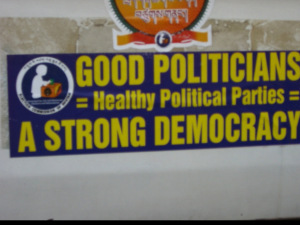
From the last election cycle, in 2007


March 9, 2013
Beautiful Bhutanese song
March 6, 2013
How not to treat the Buddha
After 9-11, when even a pizza delivery box was adorned with a giant American flag, I got a bit disgusted by how disrespectfully that symbol was being deployed (all in the name of patriotism.)
Same deal now with the Buddha.




